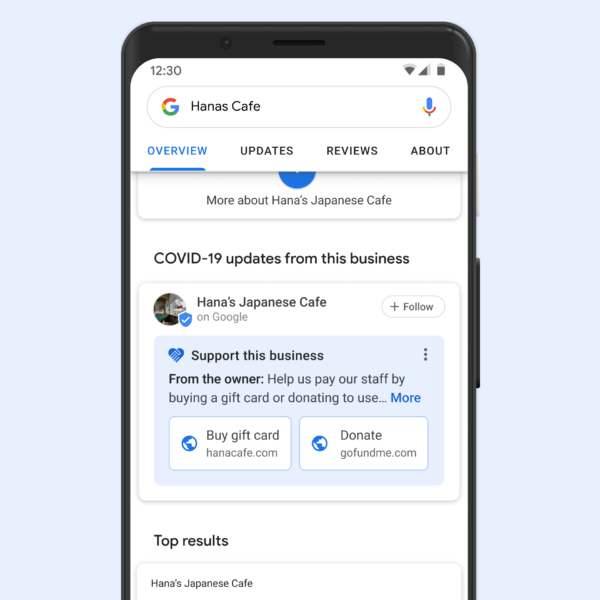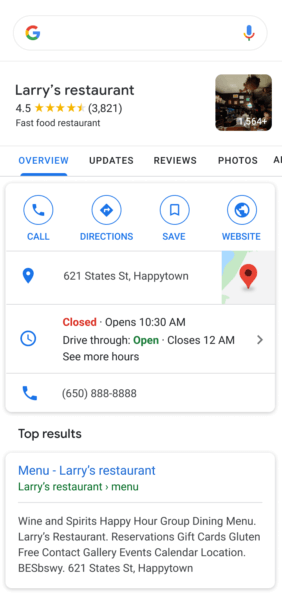Google reported searches for “how to help small businesses” spiked in March, “increasing more than 700% since February.” Partly in response to this outpouring of interest, Google introduced support links in early May. This is just one of several new features and tools Google is rolling out broadly in an effort to help local businesses survive COVID-19.
Global expansion of support links. Initially available for English speaking markets (i.e., U.S., U.K, Canada, Ireland, Australia and New Zealand), support links are now expanding to 18 additional countries including Japan, Spain and Italy. They allow business owners to add donation and gift card links to business profiles, through Google partnerships with PayPal and GoFundMe. For gift cards, Google is working with Square, Toast, Clover and Vagaro.
Google said that a business name search will expose donation or gift card links on the Business Profile (screenshot below). The company added that soon people will be able to use Search and Maps to find nearby/near me businesses seeking support.
By popular demand. I asked whether there was any evidence that these links would result in meaningful support or help to local businesses. Google’s SVP of Google Maps Jen Fitzpatrick pointed to the search query volume and added, during a conference call, that anecdotal evidence indicated high demand for them.
Support links

Online classes and virtual appointments. During that same conference call previewing these announcements, Google discussed the shift from in-person and offline services to online classes and “virtual appointments.” Accordingly, the company is going to surface online services with several new business attributes such as “online classes,” “online appointments,” or “online estimates.” Google said that “in the coming weeks,” it will make these attributes more visible in Search and Maps.
The company is also expanding the Reserve with Google program beyond in-person appointments to online services. The program features a growing roster of third party booking software providers. For online services it’s adding Booksy, WellnessLiving, Zooty and Regis to start. “Merchants working with one of these partners can offer online bookings directly on Google and share details with customers about how to pay and join the meeting using their preferred video platform,” Google said in its blog post.
As businesses begin to reopen, some of them have secondary hours. Below is an example of a restaurant that operates a drive-through after the main restaurant is closed. But this also applies to special grocery store hours for seniors or pharmacies within a larger supermarket or drugstore. (Local SEO Carrie Hill goes into more detail on secondary hours.)
Secondary hours

A million COVID posts. Among other data shared during the call, Google emphasized the success of COVID posts. The company said it has seen more than a million such posts since March, “with millions of clicks to merchants’ websites every week.” In addition, there have been “more than 200 million edits to business profiles” since February,” many of these addressing special hours and temporary closures.
In the restaurant category, “more than 3 million restaurants have added or edited their dining attributes,” (i.e., “takeout,” “delivery”) since March. And Google has added more attributes, such as “no contact delivery” and “curbside pickup.” The company is also bringing on more food-delivery services globally.
More control over food delivery. Food delivery been quite a controversial topic during the pandemic, with some delivery providers being accused of unethical business practices (e.g., hijacking listings) or extracting excessive fees from struggling restaurants. Google says it’s going to give restaurants greater control over which delivery services are associated with their profiles and the ability to identify a preferred food-delivery provider.
I asked whether Google checks to see if there’s an actual business relationship between the delivery service and the restaurant. Google says that it does but if a restaurant sees an unauthorized vendor on its profile, the owner can “contact Google My Business support to get the third-party vendor removed.”
Why we care. It’s important to point out that Yelp offers many of the same features and tools, including some that Google does not. But anyone working with local businesses or multi-location brands knows the gravitational importance of Google My Business. And while there’s nothing dramatic among the new announcements, they reflect an acceleration in the platform’s evolution — as a gateway to both offline and, increasingly, online services and e-commerce.
http://feeds.searchengineland.com/~r/searchengineland/~3/oReCrMzAoPY/new-google-my-business-features-aim-to-help-smbs-pivot-and-survive-covid-19-335183


